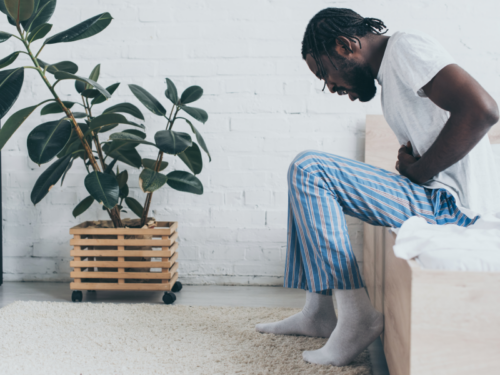
Table of Contents
What is Health Anxiety?
Written By: Charlie Health Editorial Team

Clinically Reviewed By: Dr. Don Gasparini
April 15, 2023
5 min.
It's normal to worry about your health from time to time, but if this anxiety begins to interfere with your every day life and relationships (including with yourself), it might be time to seek treatment for this specific anxiety disorder. Learn more below.
Learn more about our Clinical Review Process
Table of Contents
Health anxiety (also known as illness anxiety disorder) is a psychological condition characterized by excessive and persistent worry about one’s health. People with health anxiety may constantly check their bodies for signs of illness or disease or avoid medical exams and tests out of fear of receiving a negative diagnosis. Health anxiety can lead to significant distress and impairment in daily functioning and interfere with personal and professional relationships.
How do you deal with health anxiety?
Getting rid of health anxiety requires a comprehensive approach that addresses the underlying psychological and emotional factors contributing to the condition. One effective treatment approach is cognitive behavioral therapy (CBT), which focuses on identifying and challenging negative thought patterns and replacing them with more positive and realistic ones. CBT can also help individuals develop coping skills to manage anxiety symptoms, such as relaxation techniques and problem-solving strategies. Other therapeutic approaches that may be effective include exposure therapy, mindfulness-based interventions, and acceptance and commitment therapy.
In addition to therapy, lifestyle changes can help manage health anxiety symptoms. Regular exercise, a healthy diet, and adequate sleep can all help reduce anxiety levels and improve overall well-being. Mindfulness practices, such as meditation and deep breathing exercises, can also be beneficial in reducing stress and chronic anxiety.
Do you need more support with
your mental health?
Charlie Health can help.
How can you support someone with health anxiety?
If you know someone struggling with health anxiety, it is important to offer support and understanding. Encourage the person to seek professional help and offer to help them find a therapist or other mental health professional. Avoid dismissing their concerns or trying to convince them that their fears are unfounded, as this can be invalidating and exacerbate anxiety symptoms. Instead, listen empathetically and offer reassurance and encouragement to seek help.
Join the Charlie Health Library
Get mental health updates, research, insights, and resources directly to your inbox.
You can unsubscribe anytime.
What are the symptoms of health anxiety?
Symptoms of health anxiety can significantly impact a person's life, interfering with day-to-day activities and functioning. People with health anxiety may experience increased worry and stress associated with their physical symptoms, leading to difficulty concentrating or making decisions. Other common physical symptoms include increased heart rate, nausea, light-headedness, dizziness, sweating, and shaking.
Excessive worrying about one's health can also lead to maladaptive behaviors such as avoidance of medical procedures or treatments for fear of finding out something is wrong; excessive checking of bodily symptoms through self-examination or visiting the doctor often; obsessive researching of information related to possible medical conditions; and compulsive behavior such as counting breaths or steps. These coping mechanisms may provide temporary relief from intense fear but do little to assuage the underlying anxiety.

What are the risk factors for health anxiety?
Risk factors for health anxiety include a history of childhood trauma, significant life stressors, a family history of anxiety or depression, and personal experiences with physical illness. A person's environment can also play a role in developing health anxiety; living in an area where there is a fear of specific illnesses or receiving unhelpful advice from people around them can contribute to the development of health anxiety. Additionally, exposure to media stories related to illness or seeing someone suffering from a perceived terminal illness can also lead to health anxiety.

5 tips for managing health anxiety
While there is no cure for health anxiety, it is a treatable mental health condition. With the help of therapy and lifestyle changes, individuals can learn to manage their symptoms and reduce the impact of health anxiety on their daily lives. It is important to seek help early, as untreated health anxiety can worsen symptoms and increase distress over time.
If you are struggling with health anxiety, here are some tips that may help you manage your symptoms
1. Challenge negative thoughts
When you notice yourself having negative thoughts about your health, challenge them with evidence-based facts and rational thinking. Avoid seeking reassurance from the internet or others, as this can reinforce your worries.
2. Practice relaxation techniques
Engage in regular relaxation practices such as deep breathing exercises, meditation, or yoga to help you manage stress and chronic anxiety.
3. Seek social support
Talk to trusted family and friends about your worries and ask for their support. Join a supported group for people with health anxiety to connect with others who can relate to your experiences.
4. Practice self-care
Ensure you are taking care of yourself by eating a healthy diet, getting enough sleep, and engaging in regular exercise. These practices can help improve your overall well-being and reduce anxiety symptoms.
5. Seek professional help
Consider seeking professional help from a therapist or mental health professional specializing in anxiety disorders. They can work with you to develop an individualized treatment plan that meets your needs and goals.
Treatment options for health anxiety
Cognitive behavioral therapy (CBT)
CBT is a type of therapy that is particularly effective for treating health anxiety. In CBT, a therapist will work with the individual to identify and challenge negative thought patterns and behaviors related to health anxiety.
Exposure and response prevention (ERP): ERP is a specific type of CBT that involves gradually exposing the individual to situations or objects that trigger their health anxiety while helping them learn to resist compulsive behaviors (such as repeatedly checking their symptoms).
Mindfulness-based therapies
Mindfulness-based therapies, such as mindfulness-based stress reduction (MBSR) and acceptance and commitment therapy (ACT), can help individuals learn to manage their anxiety and focus on the present moment rather than worrying about future health concerns.
Medications
Antidepressant medication, such as selective serotonin reuptake inhibitors (SSRIs), or anxiety medication, such as benzodiazepines, may be prescribed to d help manage anxiety symptoms associated with health anxiety.
Group sessions
Group sessions can be particularly effective for individuals with health anxiety, as it provides an opportunity to connect with others experiencing similar concerns and learn from their experiences.
It's important to note that the most effective treatment plan will vary depending on the individual and their specific symptoms. It's recommended to consult with a mental health professional to develop an individualized treatment plan.
Managing health anxiety with Charlie Health
Health anxiety is a common and treatable condition that can significantly impact an individual's daily life. With the help of therapy and lifestyle changes, individuals can learn to manage their symptoms and improve their overall well-being. If you are struggling with health anxiety, seeking help from a mental health professional who can provide the support and guidance you need to overcome this condition is essential.
Charlie Health is committed to providing teens and adolescents with a proactive approach to mental wellness—all from the comfort of their homes. Our intensive outpatient program connects you with others experiencing health anxiety or other anxiety issues so that you feel seen, heard, and connected.
To learn more, read our page about other types of anxiety disorders in teens and young adults here. If you'd like to connect with a member of our Care Team about your treatment options, get started here.





